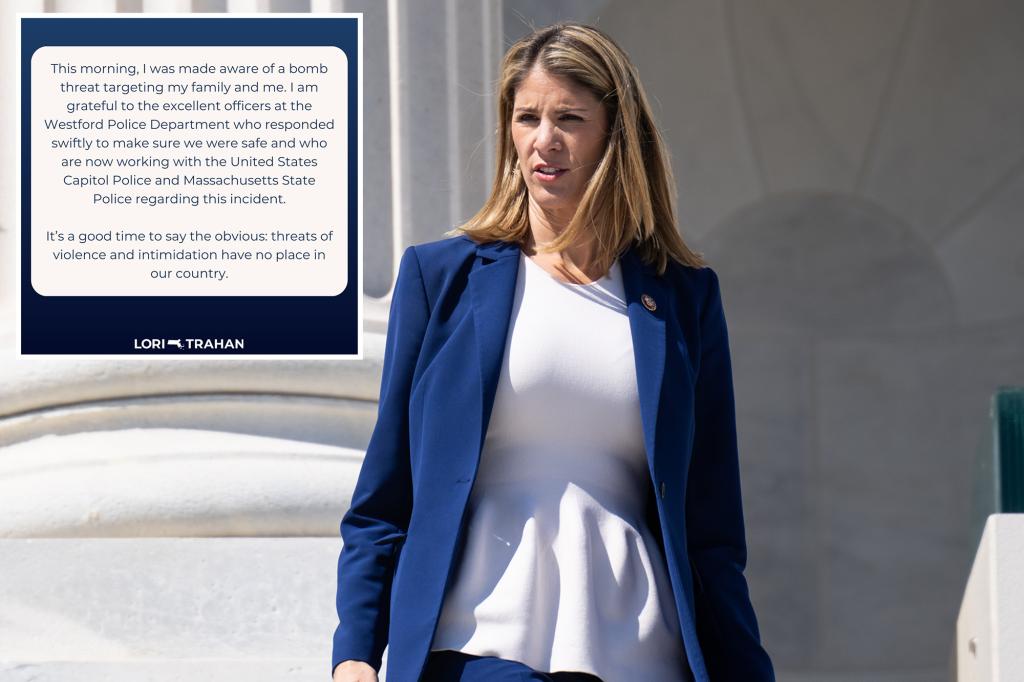The recent surge in bomb threats targeting political figures across the United States has raised serious concerns about the escalating climate of political intimidation and its potential impact on democratic processes. Representative Lori Trahan, a Democrat from Massachusetts, became the latest victim of such a threat when her family home in Westford was targeted. While law enforcement agencies swiftly responded and found no evidence of an explosive device, the incident underscores a disturbing trend of using threats of violence to disrupt political discourse and instill fear in elected officials and their families. This incident follows a pattern of similar threats directed at members of Congress from both sides of the aisle, highlighting the pervasive nature of this issue and the need for a comprehensive approach to address it.
The bomb threat against Representative Trahan mirrors similar incidents targeting other political figures, including Representative Seth Magaziner, a Democrat from Rhode Island, who was subjected to a fake bomb threat just the week before. Furthermore, a wave of phony police reports, often referred to as “swatting,” has targeted at least five members of Connecticut’s Democratic congressional delegation and over ten of former President Donald Trump’s nominees, including Representative Elise Stefanik, a Republican from New York. This pattern suggests a deliberate campaign of intimidation, regardless of political affiliation, designed to disrupt the normal functioning of government and create a climate of fear and uncertainty. The use of swatting, a tactic that involves making false reports to emergency services to elicit a large and often unnecessary response, further exacerbates the situation, diverting valuable resources from legitimate emergencies and potentially putting both the targeted individuals and responding law enforcement officers at risk.
The increasing frequency of these threats raises several critical questions about the motivations behind them and the potential consequences for American democracy. While some incidents may be isolated acts of disturbed individuals, the coordinated nature of others suggests a more organized effort to sow discord and undermine public trust in democratic institutions. The use of bomb threats and swatting incidents not only disrupts the daily lives of elected officials and their families but also creates a chilling effect on political discourse, potentially discouraging individuals from seeking public office or expressing their views freely. This erosion of trust and open dialogue can have a detrimental impact on the health of a democratic society, as it hinders the ability of citizens to engage in informed debate and hold their elected officials accountable.
Addressing this growing problem requires a multi-pronged approach involving law enforcement, technology companies, and the broader public. Law enforcement agencies must prioritize investigating these threats and prosecuting those responsible to deter future incidents. Given the often anonymous nature of online threats, close collaboration between local, state, and federal law enforcement agencies is crucial to effectively track down perpetrators and bring them to justice. Technology companies, which play a significant role in facilitating communication and information sharing, also have a responsibility to develop and implement strategies to combat the spread of misinformation and the use of their platforms for malicious purposes. This may involve strengthening content moderation policies, improving user identification and verification processes, and collaborating with law enforcement to identify and remove threatening content.
Furthermore, fostering a culture of civility and respect for differing viewpoints is essential to countering the divisive rhetoric that often fuels these threats. Political leaders, media outlets, and individuals alike have a responsibility to condemn violence and intimidation in all its forms and promote constructive dialogue that focuses on addressing the challenges facing the nation. Educating the public about the dangers of online harassment and the importance of responsible online behavior can also help create a safer and more productive online environment. Encouraging critical thinking skills and media literacy can empower individuals to identify and resist misinformation and harmful online content, contributing to a more informed and resilient society.
Ultimately, protecting the integrity of democratic processes requires a collective effort to uphold the principles of free speech and peaceful dissent while actively combating threats of violence and intimidation. By working together, law enforcement, technology companies, political leaders, and the public can create a more secure environment for political discourse and ensure that all voices can be heard without fear of reprisal. Addressing this challenge is not merely a matter of protecting individual politicians but of safeguarding the fundamental principles upon which American democracy rests. A failure to act decisively risks normalizing these threats and further eroding public trust in the very institutions that underpin a free and open society.

